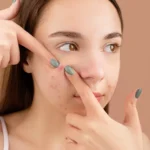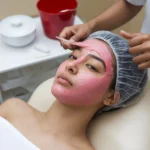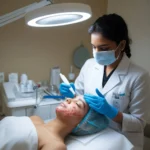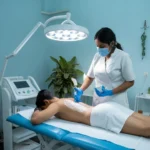How to Improve Uneven Skin Tone Caused by Dark Spots and Dull Skin?
- Home
- Skin Rejuvenation
- dark spots and dull skin
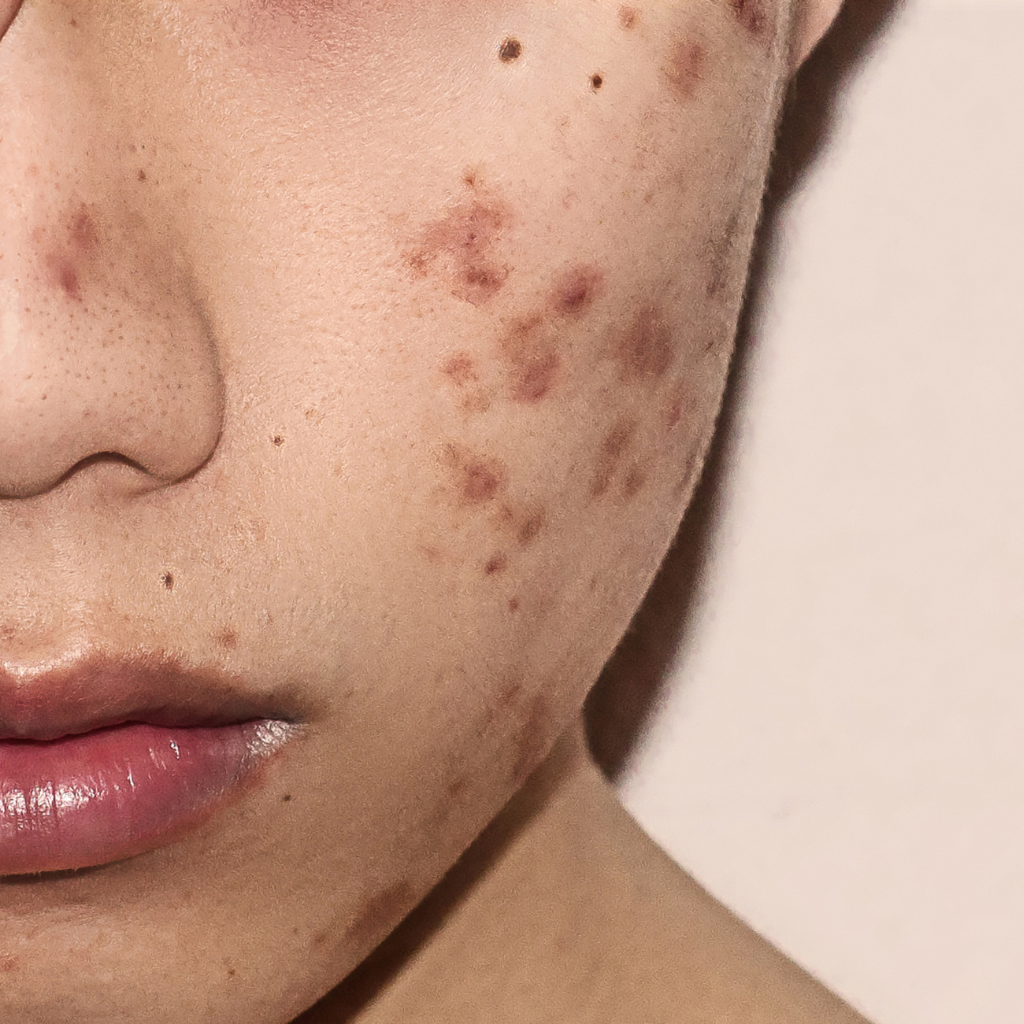
Uneven skin tone and dullness often result from UV exposure, environmental pollutants, and inadequate hydration. To improve this, incorporate Vitamin C serums to brighten the skin and reduce dark spots. Use chemical exfoliants to remove dead cells and promote a more even complexion. Daily sun protection is essential to prevent further damage. A routine with retinoids and niacinamide can enhance skin texture and radiance. Explore naturally effective treatments for dull skin for thorough skin rejuvenation.
Key Takeaways
- Use Vitamin C serums to brighten skin and reduce dark spots.
- Apply chemical exfoliants to improve skin texture and tone.
- Incorporate niacinamide to decrease hyperpigmentation and enhance the skin barrier.
- Ensure daily use of broad-spectrum sunscreen to prevent UV damage.
- Maintain hydration and consume antioxidant-rich foods for skin radiance.
What Leads to Uneven Skin Tone, Dark Spots, and Dullness?
Uneven skin tone, dark spots, and dull skin can result from various factors, including exposure to ultraviolet (UV) radiation, environmental pollutants, and genetic predispositions.
These elements can lead to hyperpigmentation and oxidative stress, which disrupts the skin’s natural renewal process and impacts its radiance.
Even with rigorous skincare regimens, intrinsic factors such as hormonal fluctuations and ageing may impede the skin’s ability to maintain an even complexion and luminosity.
What Are the Common Causes of Dull Skin in Daily Life?
Several factors contribute to the development of dull skin, uneven skin tone, and dark spots, each rooted in distinct physiological and environmental influences.
One primary cause of dull skin is the buildup of dead skin cells, which impairs skin texture and luminosity. Inefficient skin cell turnover exacerbates this issue, leading to a lacklustre complexion.
Additionally, environmental aggressors such as UV radiation and pollution can accelerate skin dullness and promote dark spots by generating free radicals that damage the skin’s structural integrity.
Inadequate hydration and poor nutrition further compromise skin tone, as essential nutrients are crucial for maintaining a healthy glow.
These factors collectively disrupt epidermal homeostasis, highlighting the need for targeted interventions to restore a radiant and even skin appearance.
How Do Dark Spots Affect Your Skin Tone and Appearance?
Dark spots, clinically known as hyperpigmentation, considerably impact skin tone by creating areas of discolouration that disrupt the uniformity of the complexion. These pigmented lesions can lead to an uneven skin tone and make the skin look dull as hyperpigmentation impairs the skin tone and texture, the overall aesthetic quality of the skin diminishes, necessitating interventions to fade dark spots. Evidence-based treatments aim to improve skin texture and brighten your complexion by targeting melanin production and distribution.
| Causes | Effects |
|---|---|
| Excess Melanin Production | Uneven Skin Tone |
| Sun Exposure | Dark Spots |
| Inflammatory Responses | Hyperpigmentation |
| Aging | Dull Skin, Altered Appearance |
Effective management strategies focus on inhibiting melanin synthesis, thereby enhancing skin tone uniformity and overall radiance.
Why Does Skin Look Dull Even With Proper Skin Care?
Why does the skin appear lacklustre despite diligent skincare efforts? Various intrinsic and extrinsic factors contribute to dull skin.
An uneven skin tone and dull complexion may result from insufficient exfoliation, which impedes the removal of dead skin cells, thereby preventing active ingredients from penetrating deep into the skin.
Furthermore, environmental stressors such as UV radiation and pollution can exacerbate the causes of dark spots and dullness.
Vitamin C deficiency also plays a role in compromised skin health, as it is vital for collagen synthesis and protection against oxidative damage.
Additionally, an individual’s skin type can influence how skin looks dull; for instance, dry skin lacks moisture, leading to a lack of radiance.
Addressing these factors is essential for achieving a revitalised appearance.
How Can You Brighten Dull Skin and Remove Dark Spots?
To effectively brighten dull skin and mitigate dark spots, the application of a clinically-proven skin brightening serum is essential, with formulations containing ingredients like hydroquinone or niacinamide showing significant efficacy.
Vitamin C, a potent antioxidant, plays a critical role in naturally enhancing complexion by inhibiting melanin production and promoting collagen synthesis.
Additionally, integrating evidence-based remedies such as chemical peels and laser treatments can further improve skin tone and luminosity.
What Skin Brightening Serum Helps Remove Dark Spots Fast?
What is the most effective way to address uneven skin tone and stubborn dark spots?
Evidence suggests that skin brightening serums, particularly those containing Vitamin C, are potent treatments for dull skin and hyperpigmentation.
Vitamin C is renowned for its antioxidant properties, which help brighten your skin by inhibiting melanin production, thereby reducing dark spots.
Clinical studies advocate incorporating such serums into a regular skin care regimen to achieve radiant skin.
These skin care products are formulated to target and diminish pigmentation, offering a promising treatment for dull skin.
Dermatologists often recommend serums as a primary intervention due to their efficacy and ability to penetrate deeply into the dermis.
Consistent use can noticeably improve skin texture and tone.
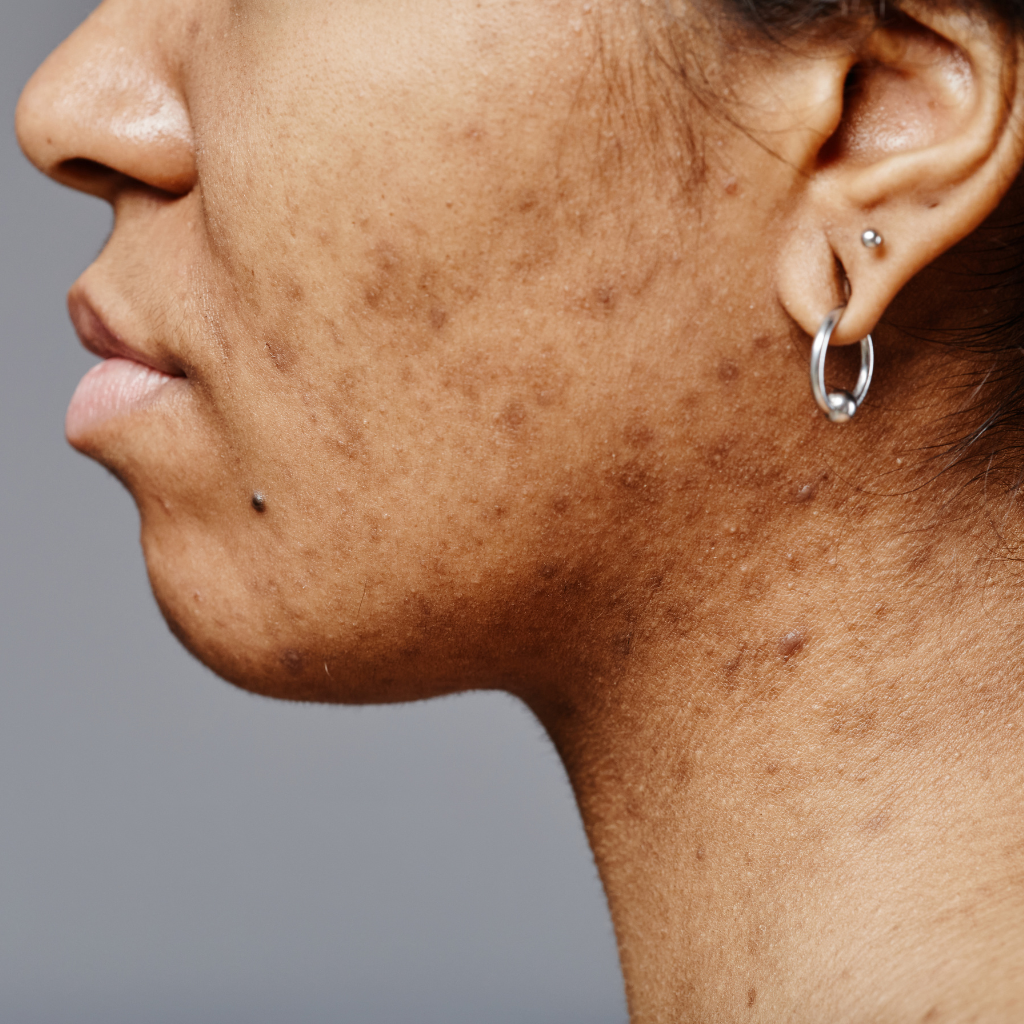
How Does Vitamin C Help Brighten Your Complexion Naturally?
Could Vitamin C be the key to naturally brightening one’s complexion and addressing concerns of dull skin and dark spots? Clinically, Vitamin C, a potent antioxidant, is renowned for its ability to brighten and even out skin tone. It reduces melanin synthesis, thereby diminishing dark spots and promoting radiant skin. This biochemical process results in a glowing skin appearance, transforming dull skin into healthy skin.
| Benefit | Mechanism |
|---|---|
| Brightens skin tone | Reduces melanin production, enhancing skin luminosity |
| Fades dark spots | Inhibits tyrosinase, an enzyme involved in melanin synthesis |
| Promotes glowing skin | Protects against oxidative stress, maintaining skin health |
| Treats dull skin | Stimulates collagen synthesis, improving skin texture and firmness |
Through these mechanisms, Vitamin C effectively addresses common skin concerns, leading to a more even and luminous complexion.
Which Remedies Help Brighten Dull Skin and Improve Tone?
While Vitamin C plays a significant role in enhancing skin luminosity, other remedies also contribute to brightening dull skin and improving tone.
Effective skin treatments focus on removing dead skin cells to reveal radiant skin underneath. Here are three evidence-based remedies:
- Chemical Exfoliants: Alpha hydroxy acids (AHAs) and beta hydroxy acids (BHAs) are clinically proven to enhance skin texture and tone by gently removing dead skin cells, thereby reducing dark spots.
- Retinoids: These Vitamin A derivatives accelerate cell turnover, promoting the emergence of new skin cells, and improve overall skin tone, diminishing the dull and lifeless appearance.
- Niacinamide: Recognised for its anti-inflammatory effects, niacinamide aids in reducing hyperpigmentation and enhances skin barrier function, resulting in skin looking radiant and more even-toned.
These remedies offer a thorough approach to achieving luminous skin.
What Skin Care Routine Is Best for a Dull Face and Uneven Tone?
A thorough skincare routine targeting dullness and uneven tone should prioritise gentle exfoliation, hydration, and protection from environmental aggressors.
Products containing ingredients like niacinamide, vitamin C, and hyaluronic acid have demonstrated efficacy in brightening skin and reducing discolouration, while formulations designed for sensitive skin can minimise irritation.
Consistent use of these targeted products, coupled with adequate sun protection, may enhance skin luminosity and prevent the formation of future dark spots.
How Can You Create an Effective Skincare Routine for Dull Skin?
Crafting an effective skincare routine for dull skin types requires an extensive understanding of dermatological principles and evidence-based practices.
To address dull skin and dark spots, a regimen should focus on enhancing brightness while maintaining the integrity of the skin barrier.
- Incorporate a Vitamin C serum: This potent antioxidant helps brighten the complexion and reduce dark spots, providing an essential remedy for skin looking lacklustre.
- Adopt gentle exfoliation: Regular exfoliation with products suitable for sensitive skin can enhance cellular turnover, reducing dullness without compromising the skin barrier.
- Ensure daily sun protection: Use broad-spectrum sunscreen to protect your skin from UV damage, a vital step in preventing further pigmentation issues and maintaining an even tone.
These foundational steps are paramount in optimising skin care for dull complexions.
What Skin Care Products Work for Sensitive Skin and Dullness?
Addressing dullness and uneven skin tone in sensitive skin requires a thoughtful selection of products that balance efficacy with gentleness.
Sensitive skin types benefit from formulations that incorporate ingredients like vitamin C, known for its antioxidative properties that help brighten and address dark spots without irritating.
Evidence suggests that vitamin C can boost skin radiance, allowing individuals to say goodbye to dull skin and achieve a brighter complexion.
Skin care products should be devoid of harsh additives, reducing the risk of inflammation.
Dermatologists recommend serums and creams containing vitamin C specifically designed for sensitive skin types, ensuring they are hypoallergenic and non-comedogenic.
Regular use can effectively improve uneven tone, targeting dark spots while enhancing overall skin luminosity and health.
Can a Routine Help Brighten Dull Skin and Prevent Spots?
How can one effectively establish a skincare routine to brighten dull skin and prevent spots? Evidence suggests structured routines notably aid in postpartum skin care. Postpartum individuals often face dullness and dark spots. A strategic regimen can help brighten and remove dull skin issues.
- Cleansing and Exfoliation: Use gentle cleansers to eliminate impurities. Incorporate exfoliants to remove dead cells, a known cure for dull skin. This process helps reveal a more radiant complexion.
- Targeted Treatments: Use serums rich in Vitamin C or niacinamide to treat dark spots and help brighten skin. These components are scientifically validated solutions for dull skin.
- Moisturisation and Protection: Hydration is essential. Apply broad-spectrum SPF to protect against UV-induced hyperpigmentation, essential for those wondering how to care for skin in postpartum.
How to Choose the Right Skin Treatment for Dark and Dull Skin?
Selecting the appropriate skin treatment for dark and dull skin necessitates an understanding of key active ingredients and their efficaciousness in enhancing luminosity and evenness.
Evidence-based options, such as topical serums containing vitamin C or niacinamide, have been shown to improve skin tone by reducing hyperpigmentation and enhancing radiance.
Additionally, non-invasive dermatological procedures like chemical peels and microdermabrasion offer viable solutions for safely revitalising dull skin.
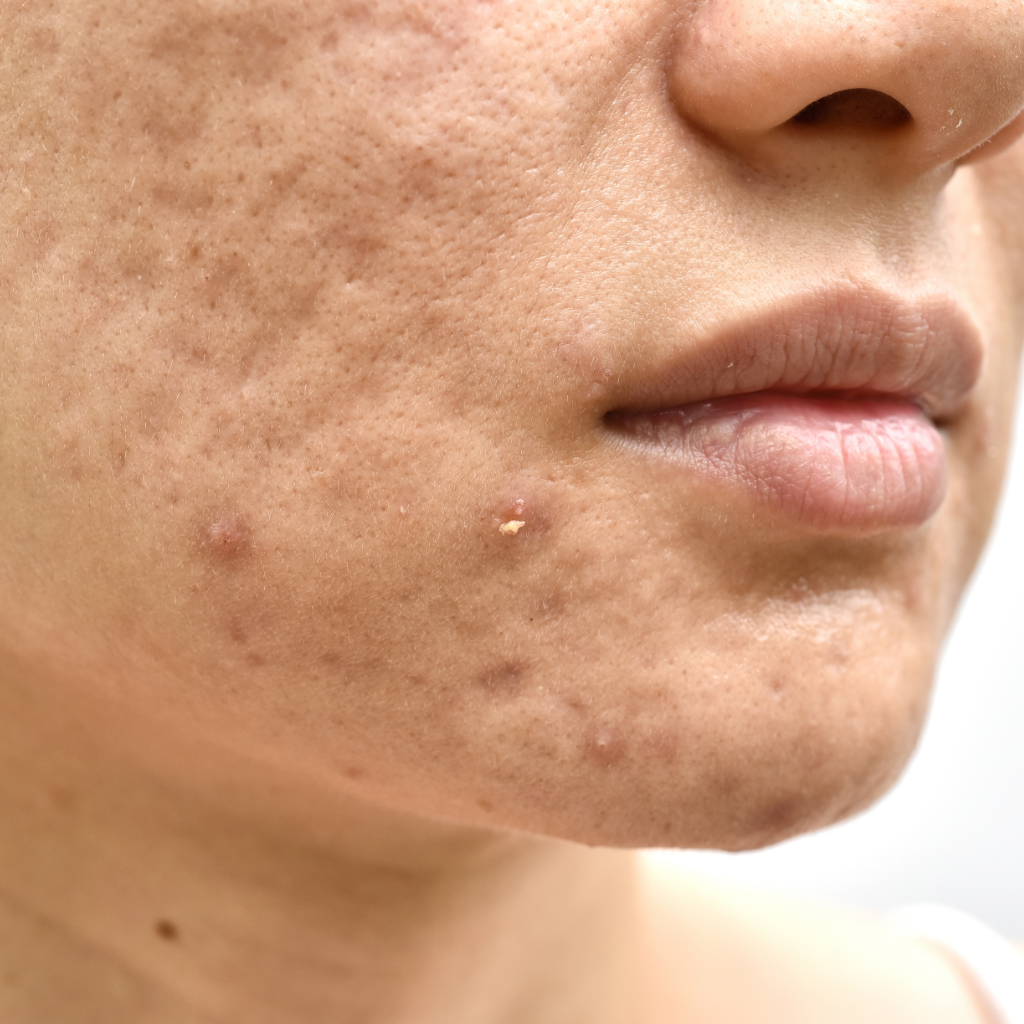
What Dull Skin Treatment Gives Brighter Skin and Radiance?
When it comes to revitalising dull skin and achieving a brighter complexion, the efficacy of treatment options hinges on understanding the underlying causes and selecting evidence-based interventions.
Dull face appearance can stem from multiple factors, such as accumulated dead cells on the skin’s outermost layer, prolonged sun exposure leading to skin damage, and insufficient hydration.
To effectively cure dull skin and prevent it from appearing dull and tired, consider the following strategies:
- Exfoliation: Regular exfoliation removes the layer of dead skin cells, which can make your skin look lifeless.
- Antioxidant-rich serums: These combat oxidative stress and can prevent factors that lead to dark spots.
- Sun protection: Utilising broad-spectrum SPF can shield the skin from sun damage, a common cause of occasional bouts of dull skin.
These tips to brighten the complexion are integral for maintaining radiance.
How Do You Select the Right Serum for Uneven Skin Tone?
Achieving a luminous and even skin tone often involves the strategic selection of serums tailored to address specific skin concerns. Clinically proven serums, rich in ingredients like vitamin C or niacinamide, can rejuvenate the skin, targeting hyperpigmentation and promoting an even look.
By enhancing the turnover of skin cells, these serums aid in revitalising the skin underneath, bringing the skin back to life. For those with dry skin, hydrating serums containing hyaluronic acid can keep your skin well-moisturised, preventing further irritation.
However, it’s essential to avoid formulations that may irritate the skin, especially for sensitive types. Consulting skin care blogs and dermatological literature can help in manoeuvring the circle of products, ensuring an informed, evidence-based serum choice.
Which Skin Treatment Options Help Cure Dull Skin Safely?
How effectively can one combat dull skin while ensuring safety and efficacy? Dull skin, characterised by a lacklustre appearance, can be revitalised through evidence-based treatments.
Dermatologists emphasise the importance of selecting modalities grounded in clinical research. Here are the recommended treatment options:
- Chemical Peels: Utilising alpha-hydroxy acids (AHAs) or beta-hydroxy acids (BHAs), these exfoliants remove superficially damaged layers, promoting cellular turnover and revealing a brighter complexion.
- Microdermabrasion: This minimally invasive procedure involves mechanical exfoliation to enhance skin texture and luminosity, proven safe in controlled clinical settings.
- Topical Retinoids: Vitamin A derivatives that accelerate cellular regeneration, reducing dullness. Retinoids have been extensively studied, confirming their efficacy in rejuvenating the skin.
Selecting appropriate treatments requires medical consultation to tailor interventions to individual skin types, minimising adverse reactions.
How to Maintain Skin Health and Prevent Dullness and Spots?
Maintaining ideal skin health and preventing dullness and hyperpigmentation requires an evidence-based approach that integrates lifestyle modifications and targeted skincare interventions.
Regular application of broad-spectrum sunscreen, coupled with a balanced diet rich in antioxidants, can mitigate oxidative stress and UV-induced melanogenesis, consequently preserving skin radiance.
Additionally, long-term radiance can be achieved through consistent use of topical agents containing retinoids and vitamin C, which promote cellular turnover and inhibit excessive melanin production.
What Lifestyle Changes Help Keep Your Skin Bright and Clear?
While environmental factors and genetics play significant roles in skin health, adopting specific lifestyle changes can markedly enhance skin brightness and clarity. Evidence suggests that consistent lifestyle interventions can mitigate oxidative stress and inflammation, both of which contribute to dullness and uneven skin tone.
- Dietary Antioxidants: Incorporating foods rich in antioxidants, such as Vitamin C and E, helps neutralise free radicals, promoting cellular repair and skin radiance.
- Hydration: Adequate water intake supports dermal hydration, maintaining cellular function and barrier integrity, essential for a luminous complexion.
- Sleep Hygiene: Quality sleep facilitates the skin’s natural repair processes, reducing the incidence of fine lines and pigmentation.
How Do You Stop Dull Skin Causes From Affecting Your Look?
Addressing lifestyle factors is fundamental, yet additional strategies exist to combat the root causes of dull skin and maintain a vibrant appearance.
Dermatological research underscores the significance of a robust skincare regimen, incorporating non-comedogenic moisturisers to fortify the skin barrier against transepidermal water loss.
Regular exfoliation utilising alpha hydroxy acids (AHAs), beta hydroxy acids (BHAs), or procedures such as dermaplaning—with careful attention to the frequency of dermaplaning treatments—promotes cellular turnover, mitigating surface dullness.
Antioxidant-rich serums, such as those containing vitamin C, neutralise oxidative stress, a known contributor to dermal deterioration.
Ultraviolet radiation accelerates photoaging; consequently, broad-spectrum SPF is indispensable year-round.
Furthermore, maintaining adequate hydration and nutritional intake, particularly omega-3 fatty acids, supports dermal health.
Clinical evidence suggests these interventions collectively sustain skin liveliness, preserving an even and luminous complexion.
What Solutions for Dull Skin Help You Look Radiant Long-Term?
To achieve long-term radiance and prevent the recurrence of dullness and spots, a multifaceted approach that integrates both topical and lifestyle interventions is essential.
Clinically, consistent use of broad-spectrum sunscreen is paramount to mitigate photodamage. Topical antioxidants, such as vitamin C, enhance skin luminosity by neutralising free radicals. Additionally, alpha hydroxy acids (AHAs) facilitate cellular turnover, improving texture and tone.
Lifestyle modifications can further support skin health:
- Nutritional Tips: Include foods high in omega-3 fatty acids in your diet and antioxidants to bolster skin resilience.
- Hydration: Adequate water intake is vital for maintaining skin turgor and elasticity.
- Sleep Hygiene: Quality sleep promotes regenerative processes, optimising skin barrier function.
This all-encompassing regimen fosters a radiant complexion, minimising the impact of environmental stressors.
Conclusion
In addressing uneven skin tone, dark spots, and dull skin, it is vital to understand the underlying causes, such as sun exposure, ageing, and environmental factors. Evidence-based strategies include using topical treatments with ingredients like vitamin C, retinoids, and hydroquinone. A consistent skincare routine emphasising exfoliation, hydration, and sun protection is essential. Selecting appropriate dermatological treatments, such as chemical peels or laser therapy, can further enhance results. Long-term skin health is maintained through lifestyle modifications and regular dermatological consultations.


